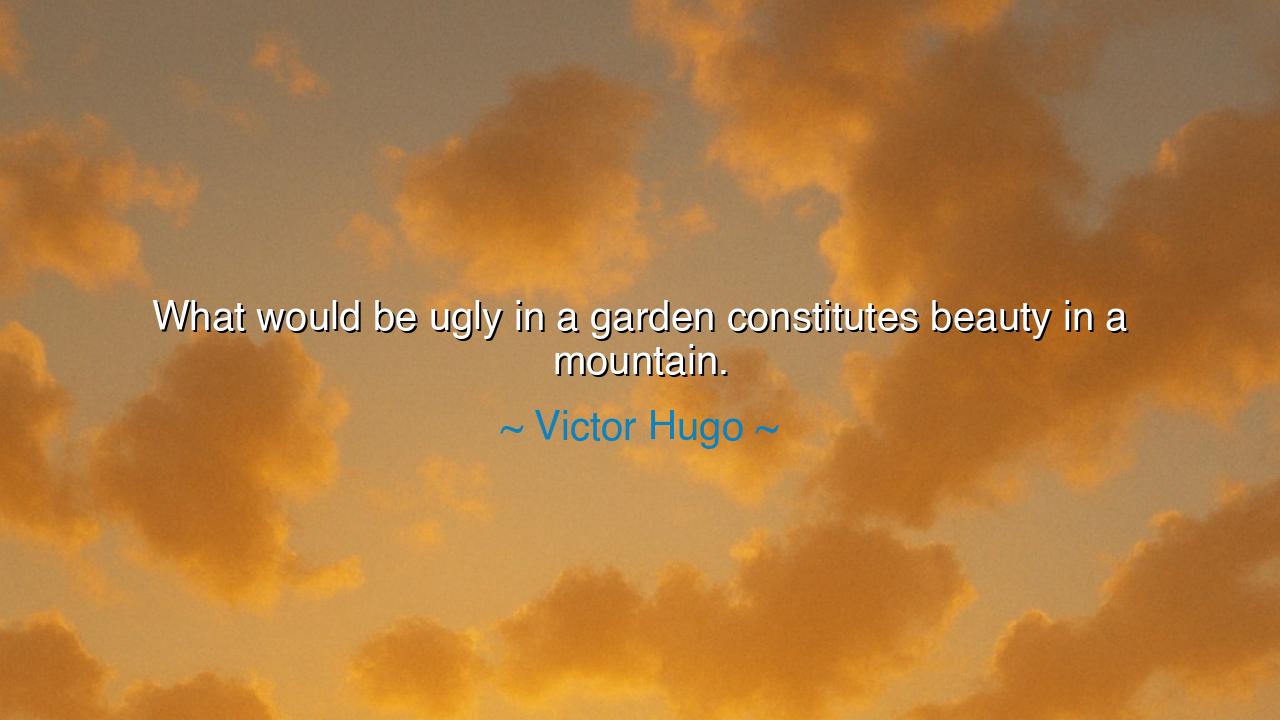
What would be ugly in a garden constitutes beauty in a mountain.






Victor Hugo once wrote: “What would be ugly in a garden constitutes beauty in a mountain.” These words, though simple in phrasing, are charged with a wisdom as vast as the landscapes they describe. A garden is a place of order, where every plant is arranged, trimmed, and controlled to satisfy the eye of man. A mountain, by contrast, is wild, untamed, and magnificent in its irregularity. Thus, the same crooked rock or twisted root that would appear as blemish in a manicured space becomes majesty upon the face of the earth’s great heights. Hugo, through this contrast, reminds us that beauty is not fixed—it is born from context, perspective, and the harmony of a thing with its place.
The origin of this reflection lies in Hugo’s vision as both poet and prophet of the Romantic age. He was a lover of both the ordered and the wild: the human creation of cities and cathedrals, and the divine creation of seas, cliffs, and mountains. He saw that beauty could not be measured by one standard. A stone out of place in a garden may disrupt the symmetry, but upon a mountain that same jagged form is the very language of grandeur. In this way, Hugo proclaimed that beauty depends on proportion, purpose, and the whole in which it is seen.
The ancients knew well this truth. The Greeks honored symmetry in their temples but worshipped the gods upon rugged peaks like Olympus. The Romans built orderly forums, yet revered the wild majesty of the Alps. In their wisdom, they did not seek to make all things alike, but recognized that each realm had its own measure of beauty: the ordered charm of the cultivated, and the awe-inspiring majesty of the untamed. Hugo, in echoing this, calls us to expand our vision of the beautiful, to embrace not only harmony but also sublimity.
History gives us striking examples. Consider the Gothic cathedrals of medieval Europe. In a garden, such jagged spires and grotesques might appear monstrous, chaotic, even ugly. But when rising above a city skyline, they became beauty itself, pointing heavenward, embodying the yearning of the soul. Or think of Japanese Zen gardens, where even a crooked rock, carefully placed, becomes an object of contemplation. Each culture, each space, teaches us that beauty cannot be separated from its setting—it lives in the marriage between form and purpose.
The meaning of Hugo’s words, then, is not confined to landscapes alone. They speak also to human life. What seems out of place, even ugly, in one setting may be glorious in another. A fierce spirit that unsettles the calm of a household may shine like fire upon the stage of history. A scar that mars the smoothness of skin may tell a story of survival, becoming a mark of dignity and strength. Like the mountain, life’s irregularities often hold a wild beauty that cannot be measured by the neatness of gardens.
The lesson for us is clear: we must broaden our vision of beauty and cease to judge all things by one narrow standard. Do not despise what appears crooked, rough, or different. Ask instead: in what setting does this belong? In what greater whole does this irregularity reveal its meaning? For often, what seems a flaw is in truth a part of a higher design, one that we cannot see until we step back and behold the mountain, not just the stone.
In practice, this means learning to honor both order and wildness. Create your gardens, yes, but also climb the mountains. In your life, value discipline, but also embrace the untamed passions that give you strength. When you see imperfection in yourself or in others, remember Hugo’s wisdom: what is ugly here may be beauty elsewhere. Seek to find the setting where every soul, every talent, every scar reveals its true glory.
Therefore, let us remember Victor Hugo’s words: “What would be ugly in a garden constitutes beauty in a mountain.” Do not confine your idea of beauty to symmetry and order, for life itself is vast and varied. The crooked root, the jagged stone, the scar upon the earth or the soul—these are not blemishes, but the very features that make mountains magnificent. And so it is with us: our irregularities are not always flaws, but often the source of our greatest strength and deepest beauty.






AAdministratorAdministrator
Welcome, honored guests. Please leave a comment, we will respond soon